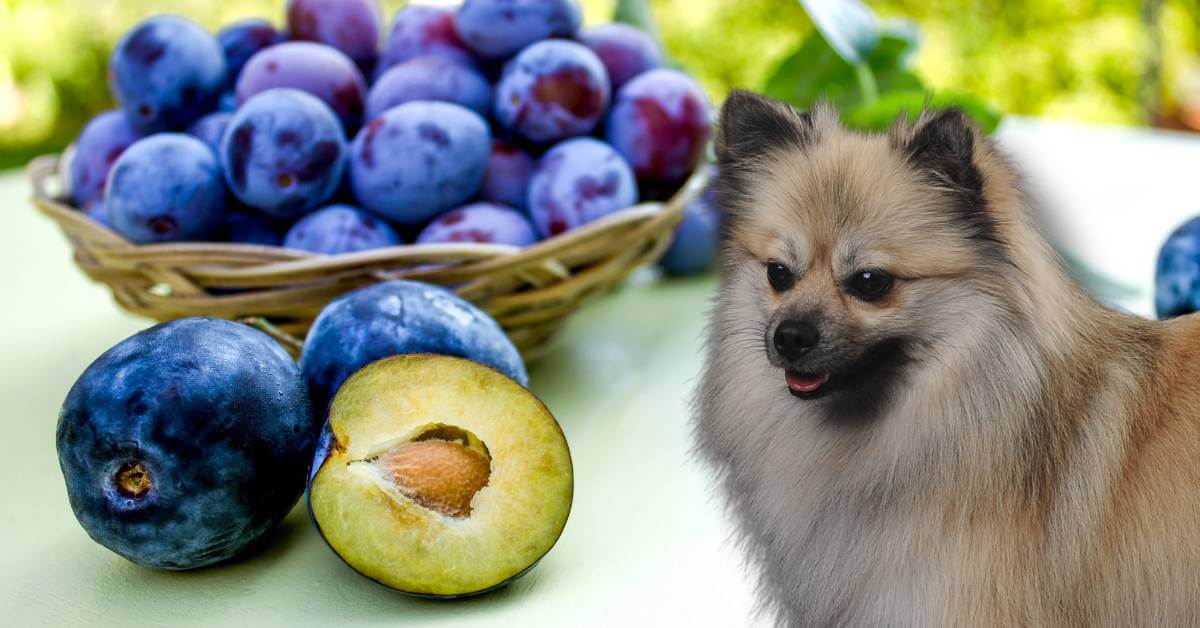Can Dogs Eat Plums?
Yes, dogs can eat plums, but only in moderation, as they are rich in fiber and can cause stomach issues if consumed in large amounts. Dogs usually like plums, and you’ll often see them eating them in the garden.

Like cherries, peaches, and nectarines, dogs should only eat plum flesh without the pits, as they can be toxic to dogs in large amounts. When we wrote about whether dogs can eat cherries, I broke down cyanide poisoning in detail and offered peace of mind, as cyanide poisoning from fruit pits is quite rare. Still, it’s better to watch your dog in the garden and ensure they don’t eat the whole fruit.
Are plums safe for dogs?
Plums are safe for dogs, but only the actual fruit! Pits and stems are not considered safe for dogs, and you should never give your dog a whole plum to eat.
First, there’s a risk of choking, and then there’s a risk of them breaking their teeth.
Next, there are pits that contain amygdalin, which converts to hydrogen cyanide when chewed. That’s the toxic component that can potentially be dangerous.
The plum flesh is safe, but if eaten in massive amounts, it can cause vomiting and runny poo.
The risks of feeding plums to dogs
Now, while plum toxicity in dogs is so rare, there are some risks when it comes to overdoing it with the fruit. Giving your dog lots of plums can cause several issues, including the following:
What about plum skin? Is it safe for dogs?
Plum skin is safe for dogs; it’s just really tough, and it rarely gets digested and dissolved by stomach acid. So, there’s nothing to worry about; just don’t overdo it, as insoluble fiber can make a mess of your dog’s digestion.
Symptoms of plum poisoning in dogs
If your dog ate a lot of plums and you suspect they managed to chew and break plum pits, you need to watch out for signs of cyanide poisoning in dogs, as plum pits contain small amounts of cyanide.
Symptoms of plum poisoning in dogs can include difficulty breathing, bright red gums, and dilated pupils. You might also notice panting or excessive drooling. In more severe cases, dogs may experience shock or even collapse.
If you notice any of these symptoms, call your vet. Although it’s super rare for dogs to get cyanide poisoning from fruit, it can be dangerous, so the sooner your dog gets help, the better.
Help, my dog ate a plum pit, what should I do?
Don’t panic. That’s the first thing. Dogs can swallow a whole plum pit and pass them out without any issues, but if you think your dog is struggling to breathe or looks like they are in pain, get them to the vet!
What you should never do is induce vomiting in these cases. The best option is to wait for their next walk and let them poop the pits out. If there’s some blood or if poo seems like it has a gooey texture, then that’s fine. However, if blood is dark or has an unusual brown color, get them to the vet ASAP!
Health benefits of plums for dogs
While plums are not a typical dog fruit like apples, they are still a healthy source of fiber that can help with digestion. Plums are also an excellent source of vitamins C and K, and they are full of antioxidants.
Just remember that fruit, like other treats, shouldn’t be more than 10% of your dog’s diet.
Types of plums and how good they are for dogs
All plums are safe for dogs, as long as you give them the flesh and not the pits! This includes cherry, red, and black plums and plumbs (sometimes called “vanilles” in the Mediterranean!).
If plums are okay, can dogs eat prunes?
No! While prunes are not toxic like raisins, they are so high in sugar and fiber, and they will give your dog an insane sugar rush! Plus, they can have a laxative effect, so if you give your dog prunes too often, they will end up with horrible diarrhea.
And if you’re wondering if dogs can eat prunes for constipation, it’s better to give other fruit, like berries or a piece of cooked pumpkin, to help them go potty than to give something so high in sugar like plums.
I hope this was a good and informative read for you. If you have any suggestions or questions, please don’t hesitate to leave a comment!
Love, life, and fur forever!
FAQs
Can dogs eat plum skin?
Yes, dogs can eat plum skin in moderation. The skin contains fiber and antioxidants, but too much might cause stomach upset. Just keep it to a small piece and always watch for any digestive issues.
Can dogs eat plumcots?
Plumcots, a hybrid of plums and apricots, are safe for dogs to eat as long as the pit is removed. Just like plums, stick to giving small, pit-free pieces to avoid any issues.
Can dogs eat prunes safely?
No, dogs shouldn’t eat prunes. They are dried plums, but they’re packed with sugar and fiber, which can cause diarrhea and even act as a laxative. It’s best to skip prunes altogether.